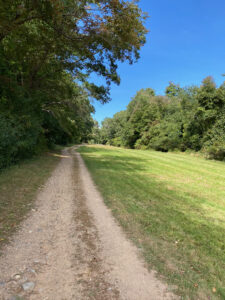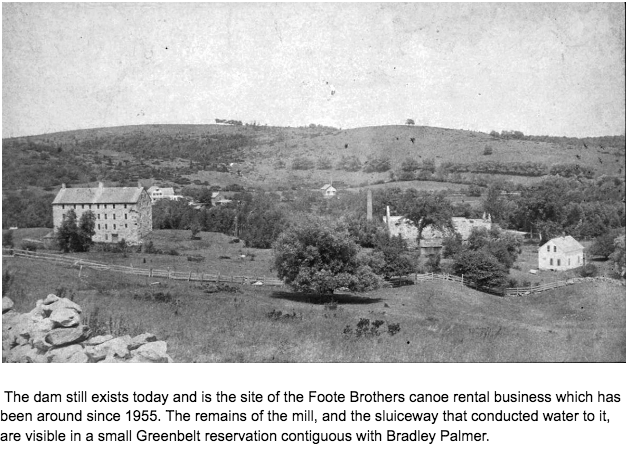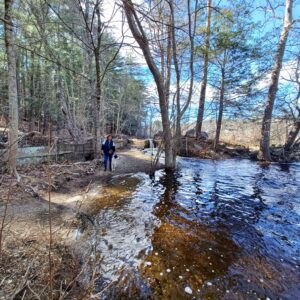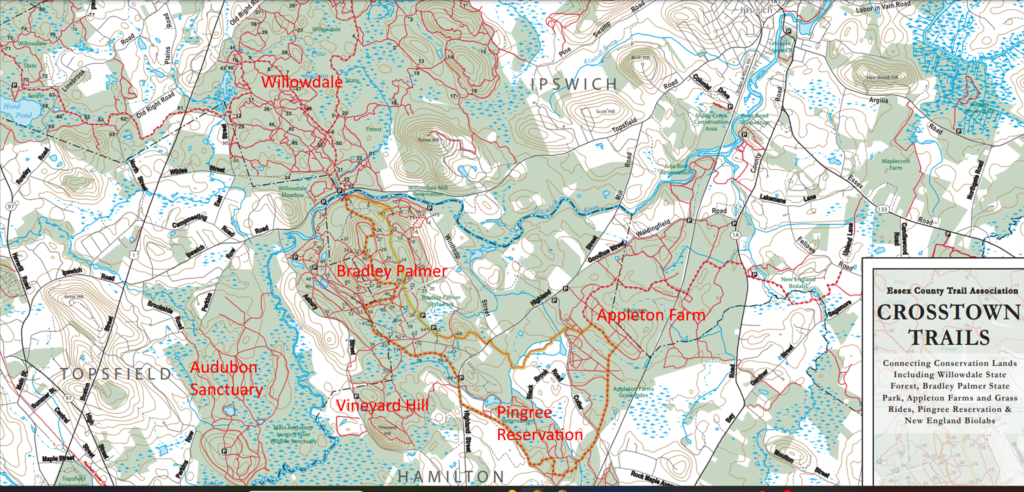Hiking Willowdale on the Ipswich River
By Richard Frenkel
 Bradley Palmer State Park has a place in my personal history, but like every stomping ground around Boston has a rich history of its own. Decades ago, when I first started walking at Bradley Palmer, there were still regular “fox hunts” through the forest complete with a pack of hounds and riders in red riding habits racing along a scent “drag.” Pedestrian and pet dog safety did not seem a high priority. The fox hunts are gone but Bradley Palmer is still a “horsey” place, one is passed sometimes by polite riders, the horse jumping obstacles are kept up but seem unused.
Bradley Palmer State Park has a place in my personal history, but like every stomping ground around Boston has a rich history of its own. Decades ago, when I first started walking at Bradley Palmer, there were still regular “fox hunts” through the forest complete with a pack of hounds and riders in red riding habits racing along a scent “drag.” Pedestrian and pet dog safety did not seem a high priority. The fox hunts are gone but Bradley Palmer is still a “horsey” place, one is passed sometimes by polite riders, the horse jumping obstacles are kept up but seem unused.
More recently I’ve become interested in the histories of the places I visit. Who was Bradley Palmer? What was this area like before it became a park of woods and meadows?
 The town of Ipswich, which sits downriver from Bradley Palmer, was an economic powerhouse in early colonial times. The river is tidal and broad in its lower reaches, and the town was established a couple of miles in from the ocean to accommodate the sailing vessels of the times. Great Cove, a wide pond-like curve in the river, now a bucolic waterfront, was home to many wharves and warehouses, a distillery and later a tannery.
The town of Ipswich, which sits downriver from Bradley Palmer, was an economic powerhouse in early colonial times. The river is tidal and broad in its lower reaches, and the town was established a couple of miles in from the ocean to accommodate the sailing vessels of the times. Great Cove, a wide pond-like curve in the river, now a bucolic waterfront, was home to many wharves and warehouses, a distillery and later a tannery.
Further up the Ipswich, just south of Bradley Palmer, a dam was built to power a saw mill with a woolen mill, Willowdale Mill, being added later. A large stone boarding house, shown in the photo below, was added to the complex in 1834 to house the mill workers. As you can see in the photo, there is no sign of the extensive forests that one finds today on the hills of Bradley Palmer park.
The dam still exists today and is the site of the Foote Brothers canoe rental business which has been around since 1955. The remains of the mill, and the sluiceway that conducted water to it, are visible in a small Greenbelt reservation contiguous with Bradley Palmer. 
Bradley Palmer himself was born in 1866 in Wilkes Barre Pennsylvania to a well connected family. His father was descended from William Palmer, a puritan who arrived in Plymouth in 1621. After attending Phillips Exeter and Harvard, Bradley Palmer became a partner in Storey, Thorndike and Palmer in his 20’s. One of their clients was Andrew Preston, a banana importer. Palmer engineered the merger of Preston’s firm with another importer, becoming an owner and director together with his law partners of the new United Fruit Company. They quickly bought 14 competitors, monopolized the banana business and became wildly wealthy. Palmer also served later as an attorney and partner for Gillette and ITT Corporation.
 Palmer never married, but he was involved in the social life of the North Shore and an avid equestrian. He bought the 747 acre Lampson family farm in Hamilton on the Ipswich River because its empty fields and pastures were ideal horse riding territory and it was close to the famous Myopia Hunt Club, the group that almost certainly organized the fox hunts I encountered 40 years ago. He built a “modest summer home” on a bluff overlooking the Ipswich and called it Willowdale.
Palmer never married, but he was involved in the social life of the North Shore and an avid equestrian. He bought the 747 acre Lampson family farm in Hamilton on the Ipswich River because its empty fields and pastures were ideal horse riding territory and it was close to the famous Myopia Hunt Club, the group that almost certainly organized the fox hunts I encountered 40 years ago. He built a “modest summer home” on a bluff overlooking the Ipswich and called it Willowdale.
Palmer went on to purchase an astounding 10,000 acres of land around Topsfield, Hamilton, and Wenham, an area more than four times the size of Lynn Woods (2,200 acres) and 12 times the size of Central Park (843 acres).
To his immense credit, near the end of his life, Palmer willed his lands ““to the people of Massachusetts as a place to enjoy the peace and beauty of river, woods, fields, and hills,” leasing back 104 acres around his estate until his death in 1946. These lands became Bradley Palmer State Park (736 acres) and Willowdale State Forest (2,491 acres), another of my favorite hiking and cross country skiing places just across the Ipswich from Bradley Palmer State Park.
Large as Bradley Palmer’s bequests are, his properties were only part of what was, and still partly is, a larger communal network of bridal trails. Communal, that is as long as you’re on horseback. As an incorrigible explorer I early on discovered these connecting trails and wasn’t always dissuaded by the equestrian only signage. Some of these former bridal paths are now open to the general public, many have been closed to any use by changes in ownership and development, and some remain equestrian only. The Essex County Trail Association was founded in 1982 to preserve and maintain these trails and provide uniform signage and up to date maps.
Knowing a bit about the history of the places we roam gives them the extra dimension of time. The Lampson house still exists at Bradley Palmer connecting us to the farm established in 1640. The dam, waterworks, and foundation of the mill on the Ipswich at the south end of the park recall the gritty early commercial life of Ipswich. Willowdale Estate gives us a glimpse into the life and society of the wealthy whose properties were linked by bridle trails. And we are grateful for the bequests of land that have preserved so much essentially contiguous open space in this part of the North Shore including Appleton Farms, Harvard Forest, Pingree Reservation, Vineyard Hill, Bradley Palmer, Willowdale Forest, and the Ipswich Audubon Sanctuary. We are much obliged.

References
Bradley Palmer State Park – Wikipedia
The William Lampson -Bradley Palmer Estate